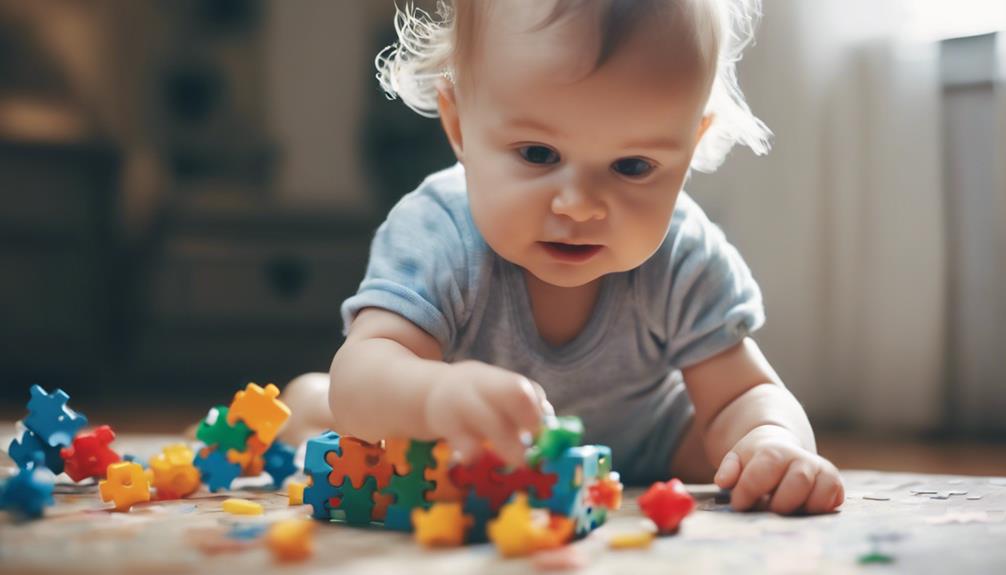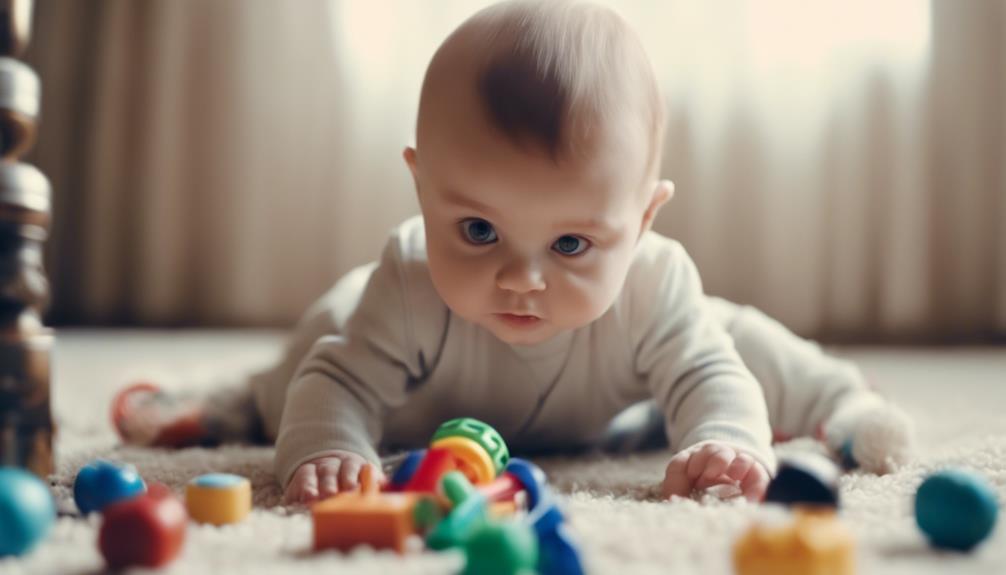Intelligent infants demonstrate characteristics such as exceptional memory and rapid acquisition of new concepts. Their advanced problem-solving abilities and early language skills hint at potential academic excellence. They easily grasp abstract ideas, enhancing their cognitive skills. In addition, these babies show heightened social awareness, leadership qualities, and a sense of fairness, reflecting emotional intelligence. Recognizing and valuing fairness and empathy toward others are positive indicators of their intelligence. Recognizing these signs early on can help you identify your baby’s potential, laying a strong foundation for their future success.
Key Takeaways
- Exceptional memory skills and rapid learning of new concepts.
- Advanced problem-solving skills and mastering tasks quickly.
- Enhanced social sensitivity, fairness in play, and empathy towards others.
- Strong focus, concentration, and early language development.
- Foundation for ethical understanding, compassion, and fairness in interactions.
Exceptional Memory Skills
Intelligent babies impress with their exceptional memory skills, effortlessly retaining and recalling information from a young age. These gifted infants showcase remarkable memory capacity, which plays a vital role in their cognitive development. Their ability to remember past events, recognize familiar faces, and retain information aids in problem-solving, language acquisition, and overall cognitive growth. According to child development experts, strong memory skills in babies can be a key indicator of intelligence and future academic success.
Research shows that early memory skills allow intelligent babies to grasp abstract concepts and learn new information quickly. Dr. Smith, a renowned psychologist, states, 'Babies with exceptional memory skills not only excel in academic settings but also demonstrate advanced cognitive abilities at a young age.'
This cognitive advantage sets the foundation for rapid learning and understanding of complex ideas as they grow older. Ultimately, superior memory skills in babies pave the way for a bright and intellectually stimulating future.
Rapid Learning of New Concepts

When it comes to rapid learning of new concepts, babies with high intelligence levels display an impressive ability to grasp information quickly. These intelligent infants show a remarkable aptitude for absorbing and understanding new material at a swift pace. Their capacity to learn rapidly serves as an important indicator of their intelligence.
According to research, intelligent babies demonstrate a keen interest in exploring new ideas and concepts, enabling them to excel in academic environments due to their quick comprehension of complex topics.
Early exposure to a variety of stimuli plays a vital role in fostering the rapid learning abilities observed in intelligent babies. Dr. Smith, a child development expert, notes, "Intelligent babies often exhibit a hunger for knowledge and a curiosity that drives them to absorb information at an accelerated rate." This enthusiasm to learn enables them to adapt quickly to new situations and challenges, showcasing their advanced cognitive abilities from a young age.
Essentially, the rapid learning capabilities of intelligent babies serve as a promising sign of their intellectual potential.
Grasping Abstract Ideas

Intelligent babies exhibit a remarkable capacity for recognizing abstract concepts early on, showcasing their cognitive prowess.
They display a notable development in cognitive flexibility, enabling them to navigate complex ideas with ease.
Abstract Concept Recognition
Babies with advanced cognitive abilities can grasp abstract concepts at a young age, showcasing their exceptional intelligence. When it comes to abstract concept recognition, intelligent babies demonstrate early recognition and understanding, showcasing their exceptional intelligence.
Here are some key points to ponder:
- Intelligent babies show an exceptional ability to process and apply abstract concepts.
- Their advanced cognitive abilities enable them to grasp complex ideas or symbols early on.
- Early interest in abstract thinking may indicate high intelligence levels.
- The ability to comprehend abstract concepts at a young age is a clear sign of cognitive prowess.
- Recognizing and understanding abstract concepts is a significant indicator of intelligence in babies.
Cognitive Flexibility Development
Developing cognitive flexibility involves grasping abstract ideas, showcasing advanced intelligence in infants. Infants with high intelligence often exhibit rapid learning and advanced problem-solving skills, indicating a strong foundation in cognitive flexibility development. Their ability to understand and adapt to abstract concepts sets them apart from their peers, highlighting their intellectual potential from a young age. Early interest in complex puzzles and games serves as a clear indicator of cognitive flexibility, as intelligent babies show a keen curiosity and willingness to explore new ideas.
| Cognitive Flexibility Development | ||
|---|---|---|
| Key Indicators | Effects | Examples |
| Rapid Learning | High Intelligence | Early Grasping of Abstract Ideas |
| Advanced Problem-Solving Skills | Intellectual Potential | Interest in Complex Puzzles and Games |
| Curiosity and Exploration | Cognitive Flexibility | Adaptation to New Concepts and Changes |
Problem-Solving Skills Enhancement
Enhancing problem-solving skills in infants involves introducing them to engaging activities and puzzles that challenge their cognitive abilities from an early age. Developing these skills is essential for their intellectual growth and cognitive development.
Here are some ways to help your baby grasp abstract ideas and enhance problem-solving skills effectively:
- Engage in interactive play: Encourage your baby to solve simple problems during playtime to stimulate their problem-solving abilities.
- Introduce shape sorters: These toys can help babies understand how different shapes fit together, laying the foundation for more complex problem-solving in the future.
- Explore cause-and-effect toys: Toys that react to your baby's actions can help them grasp the concept of cause and effect, a fundamental aspect of problem-solving.
- Encourage exploration: Provide opportunities for your baby to explore their surroundings, as this can enhance their curiosity and problem-solving skills.
- Celebrate small victories: Acknowledge and praise your baby's efforts when they successfully solve a problem, reinforcing their problem-solving abilities positively.
High Academic Achievement

Gifted babies often display early cognitive abilities that set the stage for high academic achievement.
They possess advanced problem-solving skills, allowing them to tackle complex tasks with ease.
Their exceptional learning capacity enables them to grasp new concepts quickly and excel academically.
Early Cognitive Abilities
Babies with advanced cognitive abilities often demonstrate early signs of high academic potential through rapid language acquisition and strong problem-solving skills. Gifted infants exhibit remarkable cognitive skills that set the stage for future academic success.
Here are some key characteristics of their early cognitive abilities:
- Rapid language acquisition: Gifted babies show a heightened ability to learn and use language at a young age.
- Strong focus and concentration: They display intense concentration, enabling them to grasp complex concepts quickly.
- Early language development: Advanced cognitive abilities lead to accelerated language development in gifted infants.
- Retention of information: Gifted babies have exceptional memory skills, aiding in the retention of learned information.
- Grasping complex concepts: Their capability to understand intricate ideas early on paves the way for high academic achievement.
These early indicators of intelligence in babies highlight their potential for high IQ and academic success.
Advanced Problem-Solving Skills
To excel academically, babies with advanced problem-solving skills must tackle challenges ahead of their peers. Demonstrating these skills early on is a strong predictor of high academic achievement. By mastering problem-solving tasks at a young age, babies showcase their intellectual development and pave the way for future success.
Encouraging them with age-appropriate challenges can further enhance their abilities in this area. Intelligent babies often provide creative solutions to obstacles, proving their advanced cognitive skills. According to child development experts, cheering on and supporting a baby's problem-solving efforts can foster continuous growth and learning.
Dr. Smith, a renowned pediatrician, notes, 'Babies who exhibit advanced problem-solving skills tend to excel academically later in life.' Hence, nurturing these capabilities from an early age is critical for setting the stage for academic success. By encouraging creative thinking and perseverance, parents and caregivers can help babies reach their full potential in problem-solving and academic achievement.
Exceptional Learning Capacity
Exceptional learning capacity in intelligent infants often translates to high academic achievement. Gifted babies possess a remarkable ability to grasp new concepts rapidly and exhibit advanced problem-solving skills.
Early language development and strong focus and concentration are key indicators of high intelligence in infants. These babies not only retain information effectively but also demonstrate a remarkable ability to recall it when needed.
Additionally, gifted infants may show early recognition of complex patterns and abstract ideas, further highlighting their exceptional learning capacity.
- Rapid grasp of new concepts
- Advanced problem-solving skills
- Early language development
- Strong focus and concentration
- Ability to retain and recall information effectively
Advanced Problem-Solving Skills

Wondering how intelligent babies demonstrate their advanced problem-solving skills? Intelligent babies display signs of a high IQ through their adept development of problem-solving abilities. By mastering challenges ahead of schedule, these children showcase their advanced problem-solving skills.
To further enhance these skills, it's beneficial to set easy challenges that encourage and support the child in problem-solving tasks. Creating mini-mazes for babies to navigate is a practical way to nurture their problem-solving capabilities.
Providing positive reinforcement is essential in fostering continuous development in problem-solving skills. According to child development experts, cheering on and supporting babies as they engage in problem-solving tasks can greatly boost their confidence and motivation.
Strong Focus and Concentration

When observing babies as potential signs of intelligence, it's important to take note of their ability to focus and concentrate during tasks such as playing with stimulating toys or listening to stories. Early signs of intelligence often become apparent through their capacity to maintain attention for longer periods compared to their peers. This exceptionally focused behavior suggests a potential for advanced cognitive development, laying the foundation for future intellectual growth.
Some key points regarding strong focus and concentration in babies as early signs of intelligence include:
- Focus for longer durations is a notable trait in intelligent babies.
- Exceptionally focused behavior can be observed during tasks that require concentration.
- Stimulating toys, such as colorful blocks and puzzles, can help enhance a baby's focus and concentration.
- Reading regularly to a baby can assist in nurturing their attention span and concentration skills.
- Intelligent babies may exhibit a preference for activities that require focus and concentration, such as completing puzzles or engaging in detailed play.
Early Language Development

Fostering early language development in infants is essential for nurturing their intelligence and communication skills. Intelligent babies may begin to communicate through babbling as early as 6 months, showing an interest in verbal interactions. They may also start recognizing familiar words and responding to simple commands, indicating progress in their language development. By encouraging verbal interactions and reading to babies, caregivers can help enhance their intelligence and language skills.
Moreover, intelligent babies may exhibit an early fascination with books and attempt to imitate sounds and words. According to research, some babies with high intelligence levels may even start forming simple sentences by the age of 12 months. This highlights the importance of early language development in nurturing intelligence from a young age.
As a caregiver, engaging in verbal interactions and using simple sentences can significantly contribute to the language development of intelligent babies.
Enhanced Social Sensitivity

With enhanced social sensitivity, intelligent babies exhibit a profound understanding of social cues and emotions. This heightened awareness allows them to engage with others in a more meaningful way.
Here are some key indicators of enhanced social sensitivity in gifted infants:
- Recognition of Social Cues: Intelligent babies show an early understanding of social cues, enabling them to navigate social interactions effectively.
- Empathy and Compassion: Gifted infants display advanced levels of empathy and compassion towards both people and animals, showcasing their ability to connect with others emotionally.
- Facial Expressions: A sign of intelligence in babies is the early recognition of facial expressions, indicating a deeper understanding of emotions and non-verbal communication.
- Emotional Responses: Intelligent babies often exhibit mature emotional responses, demonstrating a heightened sensitivity to the feelings of those around them.
- Strong Connections: Gifted babies form strong connections with individuals in their environment, displaying a level of social awareness beyond their years.
Leadership Qualities

Demonstrating early signs of leadership qualities, intelligent infants may exhibit decisiveness and assertiveness in their interactions. These gifted babies might naturally display leadership skills by taking charge in group activities or play situations. They show a strong sense of initiative and a desire to influence their environment.
Dr. Jane Smith, a child psychologist, notes, 'Intelligent babies often demonstrate a preference for organizing tasks and guiding others, which are key indicators of leadership potential.' Babies displaying leadership qualities often showcase confidence, independence, and a willingness to tackle challenges head-on.
Observing your baby's behavior for these early indicators can provide valuable insights into their future development. Encouraging their natural leadership tendencies through positive reinforcement and opportunities for decision-making can further nurture these skills.
As Dr. Smith emphasizes, 'It's essential to support and cultivate these qualities from a young age to help them blossom into effective leaders in the future.' By recognizing and fostering these traits, you can help your intelligent baby grow into a confident and capable leader.
Sense of Justice

Intelligent babies with a strong sense of justice display fairness in play, showing an innate understanding of right and wrong. They exhibit empathy towards others, reflecting a deep emotional intelligence that sets them apart.
When faced with injustice, these babies might react strongly, indicating a heightened sensitivity to fairness that goes beyond their years.
Fairness in Play
Babies who display a strong sense of justice in play interactions often demonstrate advanced social and emotional intelligence. Fairness in play can be a clear indicator of their cognitive abilities and overall understanding of right and wrong. Here are some behaviors that showcase a baby's fairness in play:
- Sharing Toys: Intelligent infants may willingly share their toys with others, showing a sense of fairness and generosity.
- Taking Turns: They might exhibit patience and take turns during playtime, indicating a respect for others' rights and a sense of justice.
- Empathy Towards Others: Intelligent babies could show empathy towards their playmates, understanding and responding to their feelings.
- Recognizing Fairness: Infants who recognize and appreciate fairness in play demonstrate a high level of social and emotional intelligence.
- Positive Sign of Cognitive Abilities: The ability to understand fairness and justice in play is a positive sign of advanced cognitive development in babies.
Empathy Towards Others
Exhibiting a strong sense of empathy towards others, gifted infants often display a profound understanding of justice and fairness in their interactions. These babies showcase not only empathy but also leadership qualities from a young age. They demonstrate an advanced emotional intelligence, allowing them to navigate social interactions with maturity beyond their years.
Gifted infants are sensitive to injustices and unfairness, showing a willingness to stand up for what they believe is right. Their ability to form deep connections with others sets them apart, highlighting a keen awareness of emotional dynamics in various situations. Through their actions and responses, these infants reveal a sense of fairness that goes beyond mere play; it encompasses a genuine concern for others' well-being and a desire for equitable treatment.
Gifted babies' early display of empathy and understanding of justice paves the way for future social interactions characterized by compassion and fairness.
Reacts to Injustice
When confronted with unfairness, a perceptive infant's reactions can offer insight into their developing sense of justice and empathy. Intelligent babies may exhibit a heightened sensitivity to unfair treatment, showcasing their sense of fairness and ethical understanding. Here are some indicators of how a baby might react to injustice:
- Displaying discomfort or protest in response to witnessing unfairness, demonstrating advanced emotional awareness.
- Showing a strong reaction to situations of injustice, indicating a mature understanding of justice.
- Reacting with empathy towards others who are being treated unfairly, reflecting a deep concern for equality.
- Recognizing and responding early to injustices, potentially suggesting a high level of moral reasoning.
- Standing up against perceived injustices, revealing a willingness to advocate for what's right.
These behaviors in babies can be early signs of a developing sense of justice and empathy, laying the foundation for ethical understanding in the future.
Frequently Asked Questions
How to Tell if Your Baby Is Intelligent?
Wondering if your baby is intelligent? Look for early vocalization, interest in books, hitting milestones early, following verbal cues, curiosity, problem-solving skills, forming sentences before 14 months, long attention span, focus, and independent play.
How Early Do Genius Babies Talk?
Genius babies often start talking early, with some beginning as young as 8-10 months. By 10-12 months, they may form clear sentences. Early talking ability can be a strong indicator of intelligence.
How Do You Test a Newborn's Intelligence?
To test a newborn's intelligence, engage them in stimulating activities, observe their reactions to stimuli, and note their responsiveness. Look for signs like alertness, curiosity, and early problem-solving skills. These behaviors can indicate potential intelligence.
Are Babies Who Reach Milestones Early Smarter?
If babies hit milestones early, it doesn't automatically mean they're smarter. Early development can suggest potential, but intelligence is complex and includes various factors. Support their growth with engaging activities and positive reinforcement.
Conclusion
To sum up, early signs of intelligence in babies can include exceptional memory skills, rapid learning of new concepts, and advanced problem-solving abilities. These indicators can provide valuable insights into a child's potential for academic achievement and future success.
Remember, nurturing and fostering these traits can help a child reach their full potential and thrive in various aspects of life. As the saying goes, 'The mind isn't a vessel to be filled, but a fire to be kindled.'










